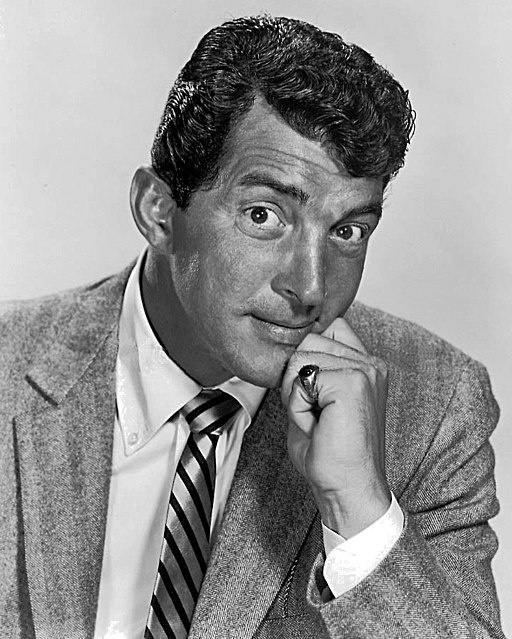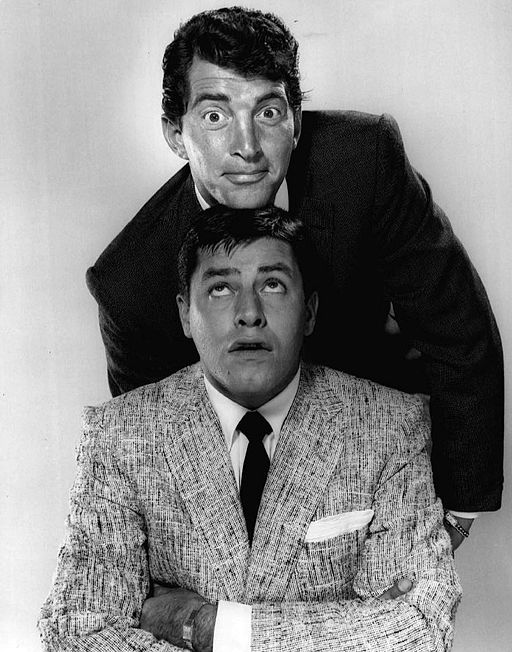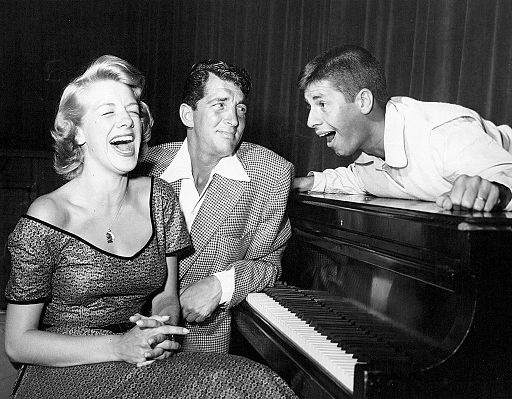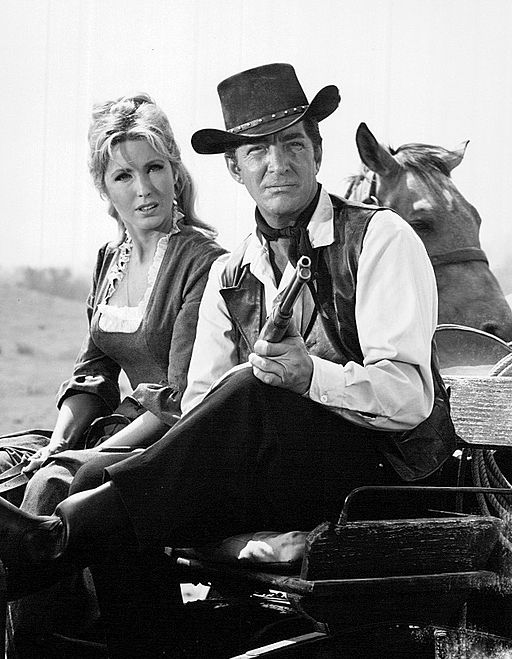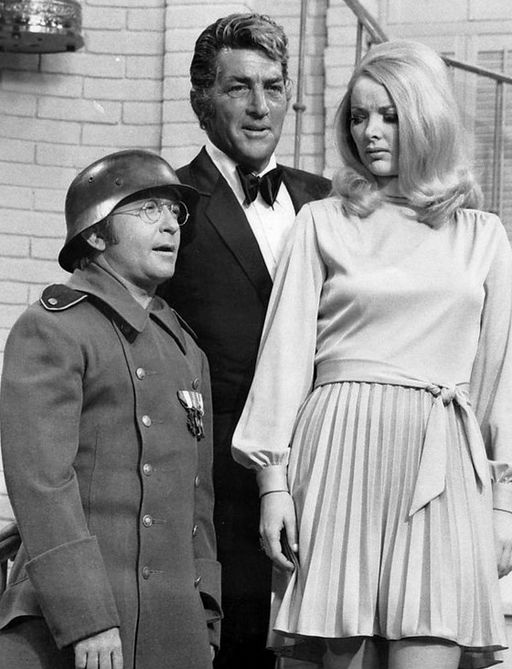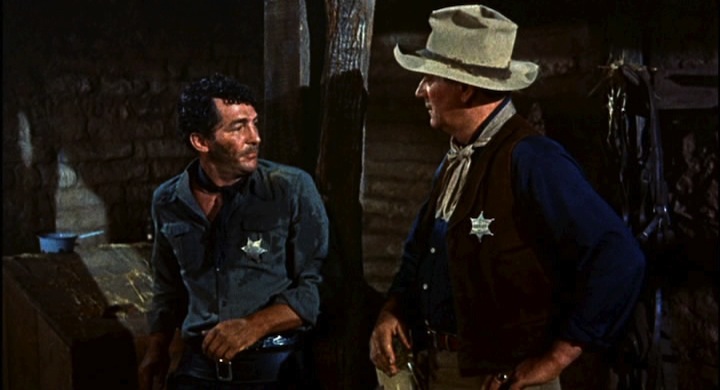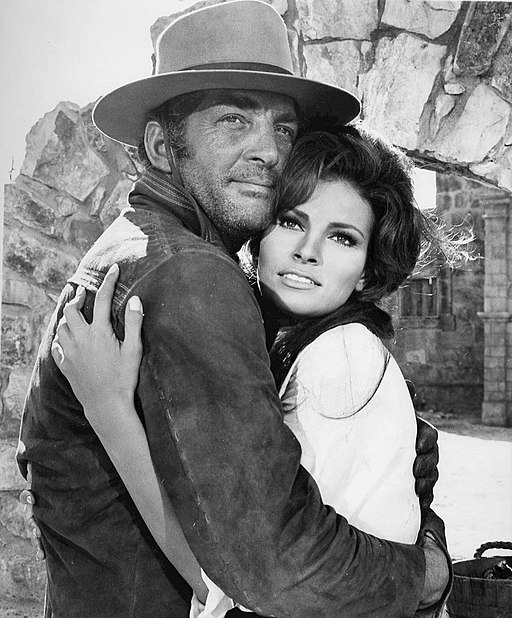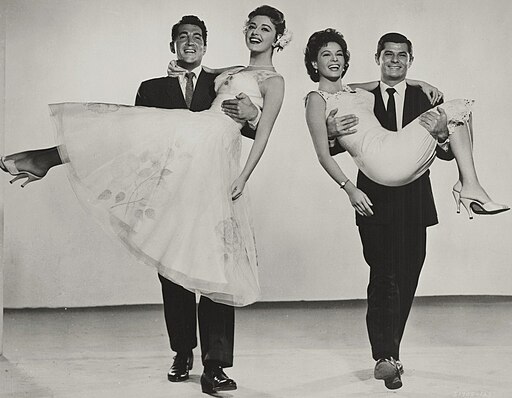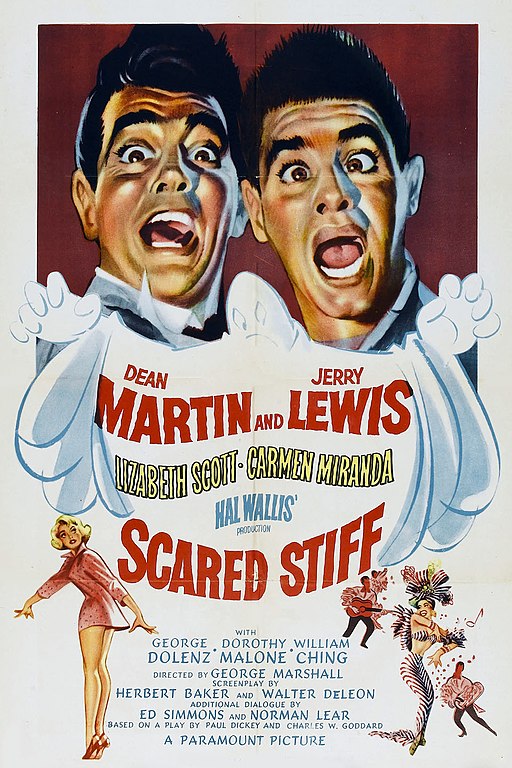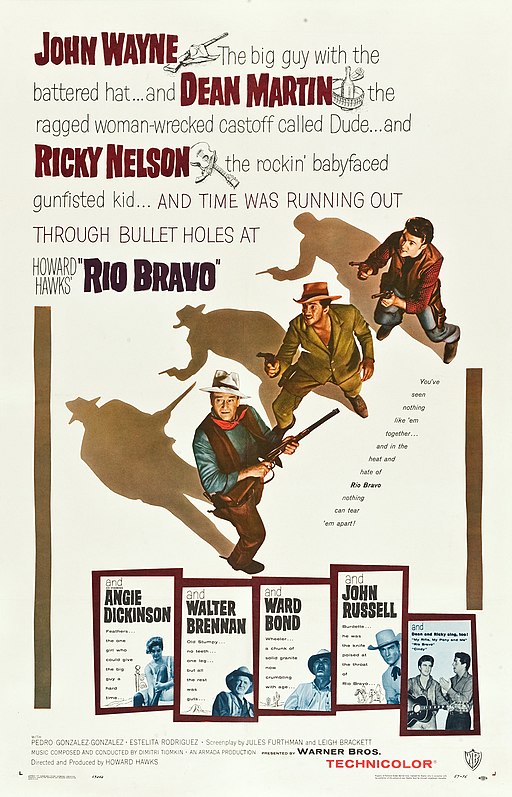Dean Martin
back| Full Name | Dino Paul Crocetti |
| Stage Name | Dean Martin |
| Born | June 7, 1917 |
| Birthplace | Steubenville, Ohio, USA |
| Died | December 25, 1995 |
| Buried | Westwood Village Memorial Park Cemetery, Los Angeles, California, USA |
| Married to | Elizabeth Anne McDonald (m. 1941; div. 1949) - Dorothy Jean Biegger (m. 1949; div. 1973) - Catherine Hawn (m. 1973; div. 1976) |
| Children | Craig Martin (b. 1942; d. 1987) - Claudia Martin (b. 1944; d. 2001) - Gail Martin (b. 1945) - Deana Martin (b. 1948) - Dean Paul Martin (b. 1951; d. 1987) - Ricci Martin (b. 1953; d. 2016) - Gina Martin (b. 1956) - Sasha Martin (adopted) |
| Notable films | My Friend Irma (1949) - The Caddy (1953) - Rio Bravo (1959) - Ocean's 11 (1960) - Airport (1970) - The Cannonball Run (1981) |
Dean Martin
The King of Cool
Dean Martin's career spanned five decades. He initially gained fame as part of a comedy duo with Jerry Lewis, before embarking on a successful solo career as a singer, actor, and member of the Rat Pack with Frank Sinatra and Sammy Davis Jr.
Martin was known for his laid-back charisma and self-deprecating sense of humor. He also hosted the popular television variety program, "The Dean Martin Show," from 1965 to 1974. Martin's legacy in music and film continues to be celebrated today.
Related
Dean Martin (1917 - 1995)
Biography and Overview of his Acting Career
Dean Martin was born as Dino Paul Crocetti on June 7, 1917, in Steubenville, Ohio. The son of Italian immigrants, his father, Gaetano, was a barber, and his mother, Angela Crocetti, was a homemaker. Growing up in a bilingual household, Martin didn't learn English until he started school, where he encountered some bullying due to his Italian heritage.
Young Dino was more interested in the boxing ring and pool halls than in school. He dropped out of high school in the 10th grade, pursuing various odd jobs including a stint as a boxer, where he earned the nickname "Kid Crochet". His early years were marked by a gritty determination to rise above the working-class life of Steubenville.
Path Towards Success
Martin's journey to stardom began with his love for music. He started his career singing in local nightclubs and bars in Ohio. His smooth voice and charismatic presence quickly made him a popular act. He changed his name to Dean Martin in the early 1940s, believing it had a better ring for a showbiz career.
His breakthrough came when he teamed up with comedian Jerry Lewis in 1946. The duo formed a popular act, with Martin as the suave singer and Lewis as the goofy comedian. They rose to fame through club performances, radio, and television, eventually becoming one of the most popular acts in America. The duo starred in a series of successful films, combining slapstick comedy with musical interludes.
Solo Career and Rat Pack Era
Martin and Lewis parted ways in 1956, after which Martin embarked on a solo career. He proved his versatility as an entertainer, achieving success as a singer, actor, and television host. He joined the Rat Pack, an informal group of entertainers including Frank Sinatra and Sammy Davis Jr., which became an iconic symbol of cool, sophisticated entertainment.
Dean Martin was often affectionately referred to as the "King of Cool." This nickname perfectly encapsulates his smooth, effortless charm and charisma, which defined not only his persona but also his multifaceted career in entertainment.
Personal Life and Marriages
Martin was married three times. His first marriage was to Elizabeth Anne McDonald in 1941, with whom he had four children. They divorced in 1949. He then married Dorothy Jean Biegger in 1949, and the couple had three children before their divorce in 1973. His third marriage was to Catherine Hawn in 1973, which ended in divorce in 1976.
Passions
Beyond his professional achievements, Martin was passionate about golf and was known for hosting celebrity golf tournaments. He was also a noted car enthusiast, and his easygoing persona was a stark contrast to his disciplined approach to his craft.
Death and Legacy
Dean Martin passed away on Christmas Day, December 25, 1995, at the age of 78. The cause of death was acute respiratory failure resulting from emphysema. Martin was a heavy smoker throughout his life, which contributed to his respiratory issues.
He was buried at the Westwood Village Memorial Park Cemetery in Los Angeles, California. Martin left behind a legacy as a multifaceted entertainer who conquered every medium he touched, from music to film to television. His relaxed, smooth style and effortless charm made him a beloved figure in American entertainment, with a legacy that continues to resonate.
Dean Martin: The King of Cool:
Analysis of the Acting Style of Dean Martin:
Dean Martin's acting style was characterized by an effortless, laid-back charisma that made him a natural and captivating presence on screen. His performances often exuded a sense of relaxed confidence, a reflection of his smooth, easy-going persona off-screen. Here are some key aspects of his acting style:
Natural Charisma
Martin's charm was perhaps his most defining trait. He had a way of connecting with the audience that felt genuine and unforced. His suave demeanor and effortless cool made him a favorite among moviegoers. This charisma allowed him to perform with a kind of ease that made even the most scripted lines seem spontaneous.
Versatility
While primarily known for his comedic roles, especially in partnership with Jerry Lewis, Martin also demonstrated considerable range as an actor. He comfortably transitioned to dramatic roles, as seen in films like "Rio Bravo" and "The Young Lions." This versatility was a testament to his underlying talent and his ability to adapt to different genres.
Chemistry with Co-stars
Martin had a remarkable ability to create chemistry with his co-stars, which elevated the quality of his performances. His interactions with Jerry Lewis are legendary, marked by a perfect balance of comedic timing and contrasting personas. In dramatic roles, he held his own alongside heavyweight actors like John Wayne, showing his capability to blend into different ensemble casts.
Understated Acting
Martin's style was often underplayed, preferring subtlety over dramatic overtures. This understatement worked to his advantage, particularly in genres like comedy and romance, where his laid-back approach allowed for a more authentic portrayal of characters. His performances were devoid of unnecessary theatrics, relying instead on his natural presence and charisma.
Musical Influence
His background as a singer often influenced his acting roles. Martin brought a sense of rhythm and timing to his performances, which was especially evident in his musical comedies. His singing abilities were often incorporated into his roles, adding a unique dimension to his film appearances.
Relatable Everyman
Despite his star status, Martin had a way of portraying characters that were relatable to the average viewer. His roles often depicted him as the charming, slightly flawed, but ultimately likable everyman. This relatability made his characters more engaging and endearing to audiences.
Memorable Quotes from Dean Martin:
- On His Relaxed Style: "In the casino, the cardinal rule is to keep them playing and to keep them coming back. The longer they play, the more they lose, and in the end, we get it all."
- On Humor and Drinking: "You're not drunk if you can lie on the floor without holding on."
- On His Singing: "I know I can't sing. But I also know the audience likes me. I'm just an Italian hillbilly."
- On Love and Marriage: "Love is a thing that can never go wrong, and I am specialist in loving."
- Self-Deprecating Humor: "I feel sorry for people who don't drink. When they wake up in the morning, that's as good as they're going to feel all day."
- On Humor: "I once shook hands with Pat Boone and my whole right side sobered up."
- On Drinking: "If you drink, don't drive. Don't even putt."
- More Self-Deprecating Wit: "I don't drink anymore. I freeze it now and eat it like a popsicle."
- On His Image: "I'm the guy who makes it look easy."
- Reflecting on Life: "I've got seven kids. The three words you hear most around my house are 'hello,' 'goodbye,' and 'I'm pregnant'."
The Rumor about the Hairpiece of Dean Martin:
Dean Martin, known for his suave appearance and smooth persona, was rumored to have worn a hairpiece, especially later in his career. This was not uncommon in Hollywood at the time, as many actors sought to maintain a youthful appearance in the public eye. However, it's important to note a few key aspects about this:
Discretion and Style
- Martin was known for his impeccable style and presentation. If he did wear a hairpiece, it would have been done with a high degree of care and attention to detail, ensuring it looked natural and aligned with his image as the "King of Cool."
Public Image
- In the era Martin thrived, there was a greater emphasis on maintaining a particular image, and less openness about things like cosmetic enhancements compared to today. Hairpieces were often used discreetly by public figures.
Lack of Confirmation
- There has been no definitive, publicly-confirmed admission from Martin or his close associates regarding the use of a hairpiece. Much of the discussion around this topic remains speculative and based on observations from photos and film footage.
Focus on Talent and Charisma
- Regardless of his hair situation, Martin's talent, charisma, and influence in the entertainment industry were the true hallmarks of his career. His potential use of a hairpiece is a minor footnote in an otherwise illustrious and impactful career.
Dynamic Duo with Jerry Lewis:
The relationship between Dean Martin and Jerry Lewis was one of the most iconic and dynamic partnerships in entertainment history. Their partnership, which lasted from 1946 to 1956, was a blend of Martin's smooth, suave demeanor and Lewis's zany, slapstick comedy. Here's an overview of their relationship:
Formation and Rise to Fame
- Meeting: Martin and Lewis first met in 1945. The two were working separately in nightclubs; Martin as a crooner and Lewis as a comedian.
- Formation of Duo: They officially teamed up in 1946 and debuted at the 500 Club in Atlantic City. Their act was a hit, combining Martin's singing with Lewis's comedic interjections.
- Broad Appeal: Their contrasting styles appealed to a wide range of audiences. Martin played the straight man to Lewis's clown, creating a perfect comedic balance.
Success in Multiple Mediums
- Radio and Television: They quickly transitioned to radio and then television, becoming regulars on NBC's "The Colgate Comedy Hour."
- Film Careers: Their success on stage and TV led to a series of successful films throughout the 1950s, including hits like "My Friend Irma," "That's My Boy," and "Artists and Models."
Tension and Breakup
- Growing Strain: Despite their success, tensions grew between the two. There were creative differences and concerns about equal billing and recognition.
- Breakup: The partnership officially ended in 1956, after a decade of immense success. The breakup was quite public and, for many years, the two did not speak to each other.
Reconciliation and Later Years
- Reconciliation: The estrangement lasted until the 1970s when Frank Sinatra engineered a surprise on-air reunion during Lewis's annual Labor Day Muscular Dystrophy telethon. This thawed their relationship.
- Later Years: In later years, they spoke more frequently, especially after Lewis's heart attack in 1982. The death of Martin's son in 1987 brought them closer, with Lewis attending the funeral.
Legacy of the Partnership
- Influence on Entertainment: The Martin-Lewis partnership significantly impacted the entertainment industry, influencing future comedy duos and setting a high standard for stage and film comedy.
- Individual Careers: After their split, both Martin and Lewis enjoyed successful solo careers. Martin became a member of the Rat Pack and a celebrated singer and actor, while Lewis became known for his work in film, both in front of and behind the camera.
Awards and recognition:
Major Awards and Nominations
- Academy Awards (Oscars): Dean Martin never received an Oscar nomination or win, which is not uncommon for performers primarily known for light entertainment and musical genres during that era.
- Golden Globe Awards: He was more recognized at the Golden Globes, which historically have been more inclusive of different genres, including comedy and musical:
- 1966: Nominated for Best TV Star - Male for "The Dean Martin Show".
- 1967: Nominated for Best TV Star - Male for "The Dean Martin Show".
- 1973: Nominated for Best TV Actor - Musical/Comedy for "The Dean Martin Show".
Other Recognitions
- Grammy Awards: While Martin was a successful singer with hits like "That's Amore," "Everybody Loves Somebody," and "Volare," he did not win or get nominated for a Grammy during his prime. The Grammy Awards were established later in his career, and his most popular songs were released before the Grammys began in 1959.
- Hollywood Walk of Fame: Martin received two stars on the Hollywood Walk of Fame; one for his contributions to the film industry and another for his work in the field of recording.
Honorary and Posthumous Recognitions
- Lifetime Achievement Awards: In later years and posthumously, Dean Martin has been recognized for his overall contributions to entertainment, though these have been more honorary in nature rather than competitive awards.
- Cultural Impact: His impact on popular culture, especially as part of the Rat Pack and in his partnership with Jerry Lewis, as well as his music career, is frequently celebrated.
All Movies starring Dean Martin:
1940s
- 1949: "My Friend Irma": Martin's film debut, a comedy where he and Jerry Lewis play struggling artists who become involved with a ditzy blonde and her cunning roommate.
1950s
- 1950: "My Friend Irma Goes West": A sequel where Martin and Lewis get entangled in a series of misadventures while trying to break into Hollywood.
- 1950: "At War with the Army": Martin and Lewis play army buddies in this military comedy filled with slapstick and songs.
- 1951: "That's My Boy": A sports comedy where Martin plays a college football star dealing with an overbearing father.
- 1952: "Sailor Beware": Martin and Lewis star in this naval-themed comedy about two sailors and their hilarious escapades.
- 1952: "Jumping Jacks": A military comedy where Martin and Lewis are involved in a parachute troop.
- 1953: "The Stooge": A drama-comedy where Martin's character, a successful singer, teams up with a comedic partner, played by Lewis.
- 1953: "Scared Stiff": A horror-comedy remake of "The Ghost Breakers," featuring Martin and Lewis in a haunted house.
- 1953: "The Caddy": Martin and Lewis play golfing partners in this sports comedy mixed with musical numbers.
- 1954: "Living It Up": A comedy about a man (Lewis) who pretends to be terminally ill, with Martin as a reporter.
- 1954: "Three Ring Circus": Martin and Lewis star in this circus-themed comedy with plenty of laughs and misadventures.
- 1955: "Artists and Models": A romantic musical comedy with Martin and Lewis playing roommates working in the comic book industry.
- 1955: "You're Never Too Young": A comedy where Lewis's character masquerades as a child to escape gangsters, with Martin as a helpful barber.
- 1956: "Pardners": A Western comedy where Martin and Lewis inherit a ranch and face outlaws.
- 1956: "Hollywood or Bust": A road trip comedy where Martin and Lewis head to Hollywood with a car won in a raffle.
1960s
- 1960: "Who Was That Lady?": A comedy where Martin plays a TV writer helping his friend to fool his wife by posing as a spy.
- 1960: "Ocean's 11": A heist film with the Rat Pack planning a massive heist on several Las Vegas casinos.
- 1960: "Bells Are Ringing": A romantic comedy-musical with Martin as a playwright and Judy Holliday as an answering service operator.
- 1961: "All in a Night's Work": A workplace comedy with Martin as a publisher and Shirley MacLaine as his love interest.
- 1961: "Ada": A political drama featuring Martin as a boisterous, ambitious politician.
- 1962: "Sergeants 3": A Western, the Rat Pack's version of "Gunga Din," set in the American West.
- 1962: "Who's Got the Action?": A comedy about gambling addiction, with Martin as a lawyer with a betting problem.
- 1963: "Come Blow Your Horn": A comedy based on Neil Simon's play, with Martin as a swinging bachelor.
- 1963: "Toys in the Attic": A drama exploring family dynamics and old resentments.
- 1963: "4 for Texas": A Western comedy with Martin and Frank Sinatra as rival gamblers.
- 1964: "What a Way to Go!": A dark comedy with Shirley MacLaine, featuring Martin in a supporting role.
- 1964: "Kiss Me, Stupid": A romantic comedy with Martin playing a famous singer-songwriter.
- 1964: "Robin and the 7 Hoods": A musical comedy set in Prohibition-era Chicago, with the Rat Pack.
- 1965: "The Sons of Katie Elder": A Western about four brothers avenging their mother's death, with Martin and John Wayne.
- 1966: "The Silencers": The first of the Matt Helm spy comedy series, with Martin as a secret agent.
- 1966: "Murderers' Row": The second Matt Helm film, featuring Martin in a globe-trotting spy adventure.
- 1967: "Rough Night in Jericho": A Western with Martin in a rare villainous role as a corrupt sheriff.
- 1967: "The Ambushers": Another Matt Helm spy comedy with Martin saving the world from evil forces.
- 1968: "Bandolero!": A Western with Martin and James Stewart as outlaw brothers.
- 1968: "5 Card Stud": A mystery Western with Martin as a gambler investigating murders.
- 1968: "The Wrecking Crew": The fourth Matt Helm movie, with Martin again as the suave spy.
1970s
- 1970: "Airport": A disaster film where Martin plays a pilot dealing with a bomb threat.
- 1971: "Something Big": A Western comedy with Martin planning one last monumental heist.
- 1973: "Showdown": A Western about two friends on opposite sides of the law.
1980s
- 1981: "The Cannonball Run": A comedy about an illegal cross-country car race, featuring an ensemble cast.

